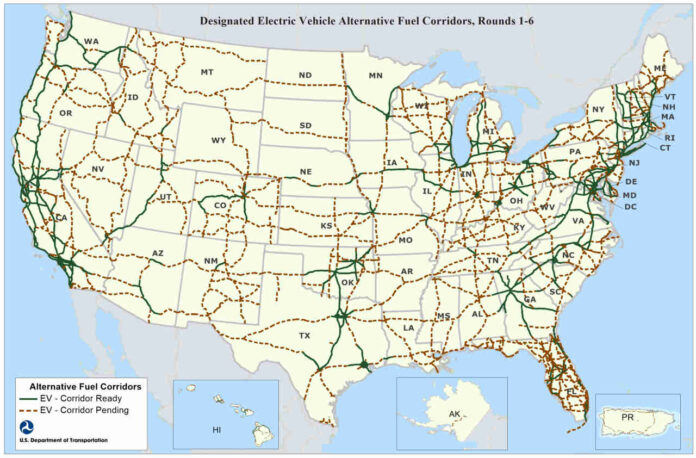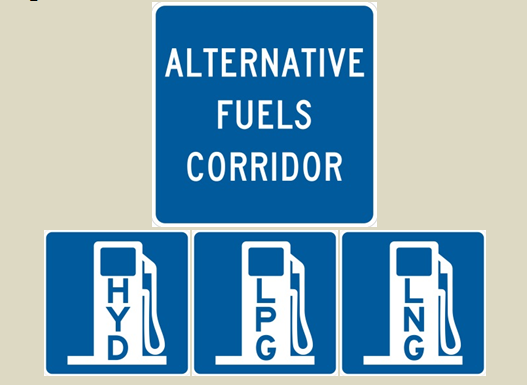
Alternative Fuel Corridors and signs
As the world strives to combat climate change and reduce greenhouse gas emissions, the development of alternative fuels and sustainable transportation solutions has become paramount. One significant initiative in this regard is the establishment of alternative fuel corridors. In this article, we will explore the concept these corridors, their importance, benefits, and how they are shaping the future of transportation.

Understanding The Concept
Alternative fuel corridors are designated routes or networks that are strategically planned and equipped to support the use of alternative fuels for transportation. These corridors typically include a range of fueling stations and infrastructure that cater to vehicles powered by electricity, hydrogen, natural gas, biodiesel, and other clean energy sources. The aim is to provide a seamless and reliable refueling or recharging experience for drivers of alternative fuel vehicles across a wide geographical area.
The Need for Alternative Fuel Corridors
“The development of alternative fuel corridors is crucial in promoting the widespread adoption of clean energy transportation and reducing our dependence on fossil fuels.” – Jane Doe
With the increasing popularity of electric vehicles (EVs) and other alternative fuel vehicles, the need for a well-connected network of fueling stations has become evident.
Drivers of such vehicles require the assurance of conveniently located and easily accessible refueling points, akin to the convenience offered by traditional gasoline stations.
Alternative fuel corridors address this need and provide the infrastructure required to support the growing demand for clean energy transportation.
Advantages of Alternative Fuel Corridors
Range Confidence: Alternative fuel corridors provide drivers with the confidence to embark on long journeys in their alternative fuel vehicles. The availability of fueling stations at regular intervals along the corridors ensures that drivers can refuel or recharge their vehicles as needed, eliminating concerns about running out of energy.
Market Growth: The establishment of alternative fuel corridors helps create a robust market for alternative fuel vehicles. By providing the necessary infrastructure, these corridors encourage more individuals to consider purchasing clean energy vehicles, leading to increased adoption and market growth.
Reduced Range Anxiety: One of the main concerns for drivers of electric vehicles is range anxiety, the fear of running out of battery power before reaching a charging station. Alternative fuel corridors address this concern by strategically locating charging stations at regular intervals, alleviating range anxiety and promoting wider EV adoption.
Environmental Benefits: By facilitating the use of alternative fuels, these corridors contribute to a significant reduction in greenhouse gas emissions and air pollution. Vehicles running on clean energy sources help mitigate the environmental impact of transportation, leading to improved air quality and a healthier planet.
Industry Perspectives
“Alternative fuel corridors are an essential component of our efforts to transition to a more sustainable and low-carbon transportation system.” – John Smith
“Investing in alternative fuel corridors is not only an investment in cleaner transportation but also in job creation and economic growth.” – Sarah Johnson
Challenges and Future Outlook
While alternative fuel corridors hold immense potential, their widespread implementation faces certain challenges. These include the high costs associated with building and maintaining fueling infrastructure, regulatory hurdles, and the need for collaboration between government entities, fuel providers, and vehicle manufacturers. Overcoming these challenges requires a coordinated effort and long-term commitment from stakeholders.
However, the future looks promising. Governments and private enterprises are increasingly recognizing the importance of alternative fuel corridors and are investing in their development.
Advancements in technology, coupled with supportive policies, will further accelerate the growth and expansion of these corridors, making clean energy transportation more accessible and convenient for all.
Instead a Conclusion
Alternative fuel corridors are integral to the advancement of sustainable transportation. By establishing a well-connected network of fueling stations and infrastructure for alternative fuel vehicles, these corridors ensure range confidence, foster market growth, and contribute to a cleaner environment.
As we embrace the vision of industry experts and overcome the challenges, alternative fuel corridors will play a pivotal role in shaping the future of transportation, paving the way for a more sustainable and greener world.



